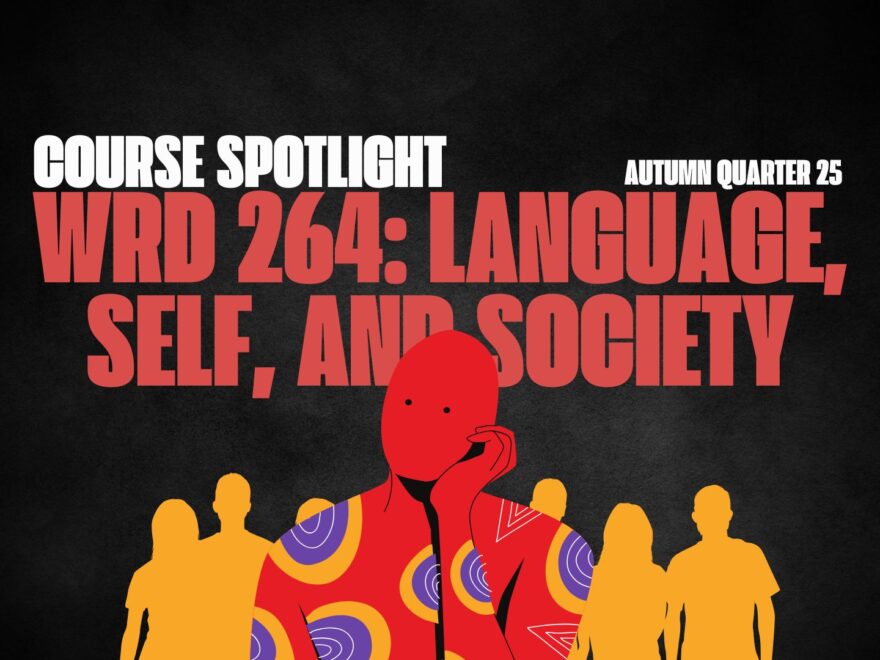How do our personal language experiences fit into larger social frameworks? This Autumn Quarter 2025, Professor Margaret Poncin Reeves seeks to answer just that in WRD 264: Language, Self, and Society. I sat down with Professor Poncin Reeves to discuss in detail what this course entails—read on to learn why you should enroll!
What are your goals for the course and what can students hope to learn?
In this course, students will think about how their personal language backgrounds connect to larger societal patterns. The course is primarily focused on the U.S., but investigates the diversity of language in the U.S., such as multilingualism, dialects and accents, indigenous languages, and changes in language with technology. Some of Professor Poncin Reeves’ interests are social media, digital media, and AI, so she plans to bring in some pertinent discussions of those topics, like how people talk online and what AI might be doing to this variety of language. For example, she shared that because AI works on probabilities, the most probable, or dominant, combinations of words or dialects of English are reinforced as the norm.
What sparked your interest in teaching this subject?
Professor Poncin Reeves shared that her interest in the personal and systemic impact of language goes back to her time as a student in the MAWRD program. In the program, the teaching language component of her coursework, including teaching multilingual writers, was impactful to her. Teaching the X sections of first-year writing, which are designed for students whose first language is not English, helped form Professor Poncin Reeves’ perspective as to how language shapes people. She shared that she finds language, and particularly the global diversity of Englishes, fascinating. After learning French, she felt like learning a second language changed her. Now, as she supports her daughter learning French as well, she continues to think about the way languages create people. She wants WRD 264 students to know that in class they will talk about their language(s) and think about how it reflects who they are (whether they want it to or not).
How is the course structured?
A large portion of the class is based around the textbook Language and Linguistic Diversity in the U.S. by Tamasi and Antieau. Each week students will cover a different topic from the book. Later in the quarter, students will be introduced to the digital aspect of language production. Students will have opportunities to research a language topic of their choice from what they read and learn as well. Professor Poncin Reeves also shared that there will be many chances to reflect, both on the lessons they’re learning and what they experience in their own language(s).
What major projects will be assigned to students?
One major assignment is a formal essay that draws on course readings and lectures, where students weave their own experiences into the course themes. There will also be a final research project where students can explore a relevant topic of their choosing in greater depth.
As you begin teaching this class now instead of Dr. Jason Schneider, do you have any insight into how your approach may be the same or different?
The class will use a very similar approach to Dr. Schneider’s version. For example, the textbook will remain the same. Students will discuss variations of language, like how one person calls it a “water fountain” whereas someone else calls it a “bubbler.” Moreover, students will learn about translanguaging, or the way that multilingual people use their full linguistic repertoire to communicate and learn.
However, the course will differ in the format it is offered in. Both Dr. Schneider and Professor Poncin Reeves worked together to put the course into FLEX format as opposed to previous versions, which were face-to-face.
What other information or advice would be beneficial for students to know before enrolling in this course?
One thing to know is that this class doesn’t require any particular background—anyone can enroll!
As for credits, the course offers credit for WRD majors as a major requirement. Students can also gain elective credit for a linguistics minor out of the Modern Languages department. Lastly, the course grants Social, Behavior, and Cultural Inquiry (SCBI) domain credit for any DePaul student.
Conclusion
Ready to enroll? Add WRD 264 Language, Self, and Society to your course cart on Campus Connect and get ready for an amazing Autumn Quarter 2025 with Professor Poncin Reeves!
Stay up to date with other course offerings through the Course Spotlights tab here on the WRD Blog.
